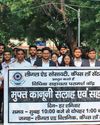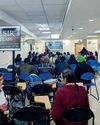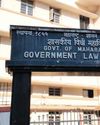
FLAME University is looking for academics and scholars from around the world, not necessarily to teach but to stay on campus and work on their research. The private university in Pune, Maharashtra is looking to become a "sabbatical hub".
"We will support them and explore channels for our faculty to collaborate with them for joint research opportunities. We are hopeful this initiative will help us to connect and engage with a larger pool of international faculty whom we could engage with for teaching and research associations. This will also help our students get a real, global learning experience," said Dishan Kamdar, its vice-chancellor.
Much freer than public institutions in matters of recruitment and salaries, private universities consciously cultivate an international environment and recruit large number of foreigners as well.
Private universities including Ashoka, FLAME, OP Jindal, Shoolini and even newer ones such as Plaksha, Rishihood have significant numbers of foreigners teaching with several of them in senior positions.
"We believe there is quite a large number of young international faculty who want to come and work in India on some interesting topics," said Atul Khosla, founder and vice-chancellor, Shoolini University.
International campus recruitment
With an eye to creating Ivy-League-type institutions - top private universities in the US Indian private institutions are recruiting from universities in the US, Ireland, Taiwan, Iran, and many more. The strong focus is also prompted by the fact that international university ranking systems such as the Quacquarelli Symonds (QS) and Times Higher Education (THE) rankings privilege an "international" campus for both students and staff.
This story is from the {{IssueName}} edition of {{MagazineName}}.
Start your 7-day Magzter GOLD free trial to access thousands of curated premium stories, and 9,000+ magazines and newspapers.
Already a subscriber ? Sign In
This story is from the {{IssueName}} edition of {{MagazineName}}.
Start your 7-day Magzter GOLD free trial to access thousands of curated premium stories, and 9,000+ magazines and newspapers.
Already a subscriber? Sign In

Sleeper Cells: Law schools' 'dormant' legal aid clinics
A law college survey by the Supreme Court's policy centre found that a worrying number of legal aid clinics do little more than hold legal awareness camps, despite NALSA, BCI rules. This leaves gaps in legal education

Law's new niche frontiers
How niche law programmes are blending science with legal expertise, transforming legal education and creating specialised career paths

'GP Sir's classes' a ray of hope for the poor
Shrishti (name changed), 31, hails from the Valmiki community based in Gurdaspur, Punjab; she was born into a family of safai karamcharis - cleaners and at 21, married into another.

DU Law Faculty is part of CLAT 2025 but plans own exam: Dean
Delhi University's Faculty of Law will admit to its BBA LLB and BA LLB courses through the CLAT exam this year.

Studying law through films, novels, comics
Law schools are using various art forms - films, comics, theatre, puppetry

Legal education meets AI
As artificial intelligence reshapes industries, India’s leading law schools are introducing specialised courses and research initiatives, often in collaboration with technical institutions. But the need for comprehensive regulations persists

A LEGACY IN CRISIS
Asia's oldest law college and alma mater to legal luminaries, Government Law College, Mumbai, now grapples with declining standards, administrative apathy, and students' shifting educational aspirations

Law Colleges for 2025
Careers360 has ranked 100 law colleges and rated over 185 institutions, categorising them into distinct zones and states, for a comprehensive overview of legal education

IIT Madras introduces another quota
After admitting five students via the sports quota in 2024-25 - a first among the IITs Indian Institute of Technology Madras has now introduced another quota for \"fine arts and culture excellence\".

CLAT answer keys and court cases
Many Common Law Admission Test (CLAT) candidates claimed to find mistakes in its provisional and final answer keys.